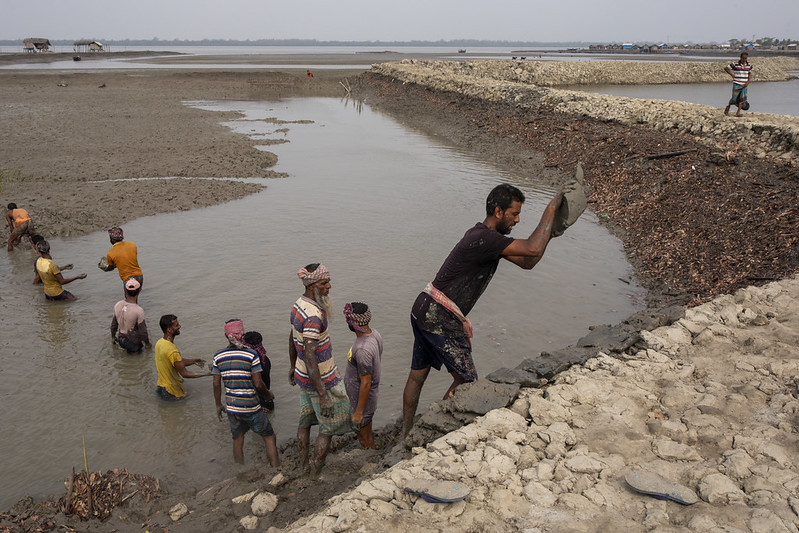Call for firm, equal focus on loss and damage at climate talks

Developing countries have raised their voices at London Climate Action Week to call for a more institutionalised approach to tackling climate-related loss and damage at the United Nations climate negotiations. CASA’s Mairi Dupar reports.
Her Excellency Saida Muna Tasneem, High Commissioner of Bangladesh to the UK called on the Government of the United Kingdom to “rise to this occasion and take loss and damage to the same [level of] importance as adaptation and mitigation” in the negotiations. The UK holds the incoming presidency of the climate talks (COP26) in Glasgow, UK in November.
Bangladesh faces sea level rise that will inundate its low-lying delta region and is expected to displace some 20 million people by 2050, H.E. Tasneem said. Already, climate-related migrants are heading to inland cities in the country, she explained.
Governments such as Bangladesh’s are urging the industrialised countries, which have emitted the most greenhouse gases, to provide technical and financial assistance to developing countries to strengthen their response to the crisis.
Specifically, they are calling for payments to compensate and provide support to people – such as the millions of Bangladeshis who are already migrating from saltwater-affected lands or will be affected in the decades ahead. These are climate change impacts that adaptation in situ cannot accommodate.
H.E. Tasneem’s comments came at an event, Loss and Damage: What we owe each other? convened by Christian Aid at London Climate Action Week.
Multifaith support for climate justice
Finance from the industralised nations to least-developed countries that are suffering the worst effects is a question of climate justice, said Archbishop Julio Murray of the Anglican Communion of Central America.
H.E. Tasneem said that Muslim communities in Bangladesh are motivated by the same and ready to join forces: “0.34% of the global carbon footprint is from Bangladesh. With next to nil emissions, why is Bangladesh bearing this injustice of high emissions of rich countries?” she queried.
More finance and on better terms
Anne-Marie Trevelyan, the UK’s International Champion for Adaptation and Resilience at COP26, told the event (via pre-recorded speech) that the COP26 Presidency is already asking donor countries and international agencies to specify how they are financing loss and damage.
“We will press for these actions and to use development and disaster risk response finance. We are calling for greater quantity, quality and access to finance,” Ms Trevelyan said.
“The taskforce on [access to] international finance aims to align support behind international climate plans for developing countries, marshalling programmatic support for countries’ own priorities, and with implementable priorities to address accessibility of climate change finance as a whole.”
However, the form in which finance is provided to pay for climate-related loss and damage and for countries to build back more resiliently, is important :
“We want money that is not insurance, not redirected aid. We want genuine funds and some kind of polluter pays approach that is fair,” specified Julie-Anne Richards of Climate Action Network Australia.
Bangladesh each year loses 1-2% of its GDP to climate-related losses. This context makes the $100 billion committed every year from rich to poorer countries (and not yet achieved) an ‘outdated concept’, H.E. Tasneem said. The Santiago Network for loss and damage, a network that aims to match up technical assistance from donors with those countries that are most affected must now be backed by serious financial resources, she proposed.
“Loss and damage is a reality … rich nations must provide additional resources on the scale required to address [it],” Fatuma Hussein of Power Shift Africa stressed.
“COP26 is supposed to be a finance COP. Let’s make it a finance COP, with additional resources targeted, scaled and sized to the loss and damage we are getting on climate change,” remarked Prof Avinash Persaud, Special Envoy to the President of Barbados.
A Loss and Damage Champion to make it happen
To galvanise the political momentum behind these asks:
- an institutionalised place for loss and damage in the UN climate talks, alongside adaptation and mitigation; and
- commensurate funding to meet the scale of developing countries’ needs
speakers called for the appointment of a COP26 Champion for Loss and Damage.
Prof Saleemul Huq of the International Centre for Climate Change and Development, Bangladesh concluded:
“What the UK presidency can do now is appoint a champion for loss and damage – we are rallying around that call”.
With high level leadership and momentum of this kind in place, participants said, the international community might pivot towards a target that has hitherto been missing: a target to reduce climate-related loss and damage over time.
Image: dyke construction, Bangladesh, photograph courtesy of IMF